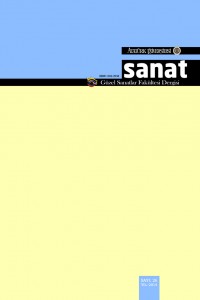Öz
ÖZET
1940’lı yıllarda Türk Resim Sanatına yön veren Yeniler Grubu ressamları, doğayı bir birlerinden farklı ancak güncel birer yorumla resmetmişlerdi. Bu güncel resim anlayışında Avrupa’da aldıkları resim eğitiminin etkisi büyüktü.
Yeniler Grubu doğayı batılı bir biçim anlayışının yanı sıra Anadolu içselliği ile yeniden betimleme çabasındaydılar. Bu Anadolucu bakış açısıyla toplumcu bir anlayışı eserlerine yansıtma çabasında olmuşlardır. Anadolu insanının yaşamı,
kırsal hayat, çiftçilik, iş ve işçi gibi konular, Yeniler Grub’u ressamlarının resimlerinde görülebilmekteydi. Bir çok sergi açan Yeniler Grub’u ressamları, toplumsal söylemlerini uzun süre devam ettirirken Grubun sanatçılarından bazıları zaman içerisinde toplumsal söylemden uzaklaşıp zamanlarının etkisiyle daha güncel konulara yöneldirler.
Anahtar kelimeler: Yeniler Grubu, doğa türk
ABSTRACT
Reorienting the Turkish Art of Painting in 1940s, the painters of the Yeniler Grubu painted the nature as different from each other but with today’s interpretation. The painting education they received in Europe was much effective on this manner of painting. The Yeniler Grubu strove to redepict the nature through the internality of Anatolia as well as through the Western understanding of form. Through this Anatolian viewpoint, they tried to reflect a socialist understanding on their works. In the paintings of the
painters of the Yeniler Grubu were the themes such as Anatolian people’s lives, rural life, farming, and work and workers. While the painters of the Yeniler Grubu holding a wide variety of exhibitions continued their socialist speech for long, some of the painters of the Group deviated from the socialist speech, turning towards more up-to-date issues with the effect of their time.
Keywords: The Newcomers Group, Nature, Turk
Ayrıntılar
| Bölüm | Makaleler |
|---|---|
| Yazarlar | |
| Yayımlanma Tarihi | 3 Şubat 2016 |
| Gönderilme Tarihi | 3 Şubat 2016 |
| Yayımlandığı Sayı | Yıl 2014 Sayı: 26 |

Bu eser Creative Commons Atıf-GayriTicari 4.0 Uluslararası Lisansı ile lisanslanmıştır.


